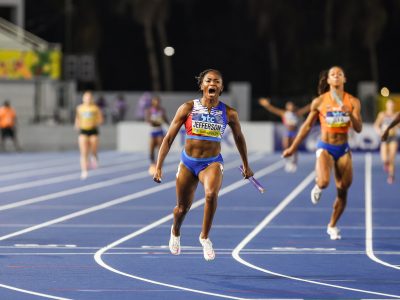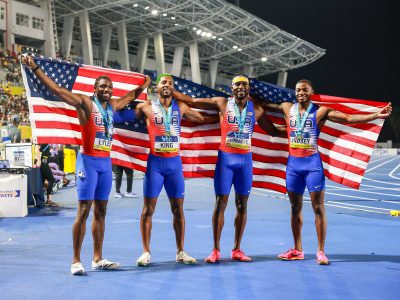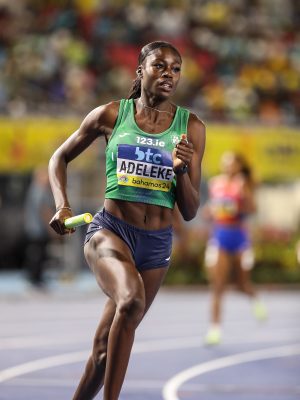6 Things We Learned at the 2024 World Relays: Tebogo & Adeleke Impress, & Who Will Stop the US Men?
By Jonathan GaultThe United States put on a show at the 2024 World Athletics Relays last weekend in the Bahamas. Led by Noah Lyles and Gabby Thomas, Team USA won all four finals in which it was entered on Sunday night in Nassau: the men’s and women’s 4 x 100, women’s 4 x 400, and mixed 4 x 400. The US only failed to win the men’s 4 x 400, where the Americans were DQ’d in Saturday’s prelims after third leg Champion Allison illegally moved positions before receiving his handoff. Botswana won that event instead, with 20-year-old phenom Letsile Tebogo splitting 43.72 for leg 2, but the US men’s 4 x 400 team easily qualified for the Olympics out of the repechage round.
The 2024 edition was the first World Relays in three years, and the event has undergone a number of changes since the inaugural edition in 2014. The first World Relays featured wide variety of events, from the 4 x 100 to the 4 x 1500, but after a number of uncompetitive races, the distance relays were phased out and the event became a sprint-only meet starting in 2019.
For 2024, World Athletics made another big change, deciding that the World Relays would serve as the main qualifying meet for this summer’s Olympics: 14 of the 16 spots in each of the five Olympic relays (men’s and women’s 4 x 100 and 4 x 400, mixed 4 x 400) would be awarded based on World Relays results. The remaining two will go to countries with the top times within the Olympic qualification window (12/31/22 – 6/30/24).
For the most part, this change was well-received. We’ve always held the view at Letsrun that track and field doesn’t need more meets – it needs more meets that matter as track & field is at its best when there are genuine stakes, and there are few bigger rewards than Olympic qualification. Turning the World Relays into the de facto first round of the Olympic Games meant that all but the biggest countries were forced to send strong teams, and a bunch of stars showed up in Nassau, including Lyles, Tebogo, Femke Bol, Shaunae Miller-Uibo, Marcell Jacobs, and even 800m world champion Marco Arop, who tried to help his Canadian team qualify in the 4 x 400 (they wound up missing out).
While the meet dragged on at times (Sunday night’s session spanned nearly three-and-a-half hours), the atmosphere was great and even some of the repechage races produced dramatic finishes. When a race matters to the athletes, that feeling carries over to the viewer, and watching the celebrations by those teams that clinched Olympic berths — featuring some athletes who may not have otherwise qualified for the Games — it was hard not to get excited.
Here are six big takeaways after two days of relay madness in the Bahamas.
1) “Who Gon’ Stop Us?”
“Who gon’ stop us?”
Those were the words Noah Lyles delivered into the camera after Team USA dominated the men’s 4 x 100 on Sunday night, the first time it had won this event at the World Relays since 2017.
"WHO GON' STOP US?!"
Noah Lyles cruises on the anchor leg to deliver Team USA's third final victory at #WorldRelays. pic.twitter.com/YWpipCz61g
— NBC Olympics & Paralympics (@NBCOlympics) May 6, 2024
The answer, if anyone, is the same as always: the USA.
Outside of the Jamaican golden era of Bolt, Blake, and Powell, the USA has almost always had the most talented men’s 4 x 100 squad — and usually, it isn’t close. Yet the results of recent global championships tell a different story. The US has claimed gold at just two of the last 12 global championships in the men’s 4 x 100. They have not even medalled at the Olympics since 2004; their last Olympic gold came in 2000, when Lyles was all of three years old.
When the Americans are at their best, no one can touch them. We saw it in Doha in 2019, when the team of Christian Coleman, Justin Gatlin, Mike Rodgers, and Lyles ran 37.10, the #3 time in history. And we saw it last summer in Budapest, where Coleman, Fred Kerley, Brandon Carnes, and Lyles took gold in 37.38.
But there have been missteps lately, too. The US embarrassingly failed to run fast enough to qualify for the 2021 Olympic final, andthen somehow managed to finish 2nd to Canada on home soil at the 2022 Worlds despite going 1-2-3 in the individual 100.
The good news is that the US quartet of Courtney Lindsey, Kenny Bednarek, Kyree King, and Lyles was terrific in the Bahamas. They ran 37.49 in the prelims to easily qualify for the final, and the same four men (in the same order) ran 37.40 on Sunday to win the gold handily with no major issues in six handoffs across two days.
That right there could be a winning team. 37.40 was fast enough to win gold at the 2021 Olympics and 2022 Worlds and was faster than every country outside of the USA at the 2023 Worlds. But it’s never that simple in the USA. As good as Lindsey was last weekend, would US relay coach Mike Marsh really remove Christian Coleman — one of the greatest starters in history and leadoff man on the 2019 and 2023 gold-medal teams — from the first leg? And what about Kerley, Trayvon Bromell, and Erriyon Knighton? Between athletes, agents, and coaches, Marsh will have to balance the desires of a dozen different people while selecting the team best-suited for gold in Paris. Given the American talent pool, it’s a challenge most federations would kill for, but it is still a challenge.
The US will enter the Olympics as the favorites, and the results in Nassau last weekend were impressive and encouraging. But this team will be judged by its result in Paris.
From 2021: LRC What Really Happened with the US Men’s 4×100 Team in Tokyo? And What Can Be Done to Fix it?
2) Letsile Tebogo impressed with back-to-back sub-44 splits
The star of the men’s relays was Letsile Tebogo, who was tremendous in helping Botswana to gold in the 4 x 400. Though Tebogo is a Worlds medalist in the 100 and 200, he had already shown impressive range in 2024, setting the 300m world record of 30.69 in February and running a 400m pb of 44.29 in March.
So we knew that Tebogo had sub-44 ability on the relay, but to see him do it twice in just over 24 hours was very impressive. Across 16 races (prelims, finals, and repechage of the men’s 4 x 400 and mixed 4 x 400), Tebogo had two of the three fastest splits. His 43.49 in the 4 x 400 prelims was the best by anyone all weekend, and his 43.72 in the final was #3 (Great Britain’s Charles Dobson was #2 thanks to his 43.63 in the mixed 4 x 400 prelims).
Tebogo would be among the favorites for 400m gold in Paris this year buthe told reporters afterwards that he has no immediate plans to move up in distance.
“I will be tempted to move maybe in a couple of years,” Tebogo said. “Not now. It’s very fun in the 100 and the 200. The 400 is very painful. No child’s play.”
Tebogo also has the opportunity to do something no man has ever accomplished at the Olympics: triple gold in the 100, 200, and 4 x 400. Noah Lyles, of course, has spoken about attempting the same triple (with the 4 x 100 thrown in as well). And while the US has a better shot at gold in the 4 x 400, Lyles does not have a clear path to putting himself on that team. Tebogo, meanwhile, would not only be part of Botswana’s 4 x 400; he would be their best runner.
Tebogo is headed to the US next. He will face Christian Coleman in the 100 at the LA Grand Prix on May 18, followed by a race against Erriyon Knighton and Kenny Bednarek over 200 at the Pre Classic on May 25.
3) Gabby Thomas pulled double duty for Team USA
Only one athlete took home two gold medals from the World Relays: American Gabby Thomas, who ran the second leg for the winning 4 x 100 on Sunday night, then returned 20 minutes later to run the second leg of the winning 4 x 400. If she was tired, she didn’t show it as her 49.58 split was the fastest on Team USA and second-fastest of the night overall behind Poland’s Worlds silver medalist Natalia Kaczmarek. Thomas, who ran 49.68 in the open 400 last year, has the chance to do what Allyson Felix did in 2012 and 2016 and win gold in both relays this summer in Paris.
The turnaround was tight, but pulling double (or triple or quadruple) duty and closing it out with a fast 400 split is nothing new for Thomas. Six years ago Monday, she won the 100, 200, 4 x 100, and 4 x 400 for Harvard in the span of one day at the 2018 Ivy League Heptagonal Championships (she also won the long jump the day before). Her 4 x 400 anchor split was 49.44 and resulted in one of the greatest races in Ivy League history (as well as one of the greatest hand splits ever by LetsRun.com’s own Robert Johnson on the broadcast).
What an incredible final leg of the 4x400m relay for Gabby Thomas and Harvard wins it! #GoCrimson #IvyHeps pic.twitter.com/PNT6uz6Ld1
— Harvard T&F | XC (@HarvardTFXC) May 6, 2018
4) Ireland’s Rhasidat Adeleke was incredible
As a country of just over 5 million, Ireland does not have much of a history in the relays. But they have a budding star in 21-year-old Rhasidat Adeleke, who is helping the team to new heights. On Saturday, Adeleke split 49.64 in the mixed 4 x 400 and 49.48 in the women’s 4 x 400 as Ireland won both of its heats to qualify for the Olympics in both events.
On Sunday, with just one race on the docket (she skipped the women’s 4 x 400), Adeleke split 48.45 to help Ireland to bronze in the mixed 4 x 400 — the fastest women’s split of the entire meet (and more than a second faster than Femke Bol and Marileidy Paulino split in the same race).
Last year, Adeleke ran 49.20 (#2 NCAA all-time) to win the NCAA 400 title for Texas in June and held on impressively well after a long collegiate season to finish 4th at Worlds more than two months later. Now a professional, Adeleke’s main focus is the Olympics in 2024, and so far things are looking good; the week before her relay heroics in the Bahamas, Adeleke ran 10.84 in the 100 (+3.5) in Austin to crush training partners Dina Asher-Smith (11.10) and Julien Alfred (11.15). Only one Irishwoman has ever medalled in track and field at the Olympics (Sonia O’Sullivan took 5,000 silver in 2000). Adeleke is looking like a medalist in the flat 400 and, after this weekend, perhaps the mixed 4 x 400 as well.
MB: Rhasidat Adeleke: the next big 400m star?
5) Joseph Fahnbulleh still knows how to close
There are few things more fun to watch in track & field than Joseph Fahnbulleh in full flight. Though it takes him a while to get going, few athletes can rival Fahnbulleh’s top gear, which he showed in 2022 when he swept the NCAA 100- and 200-meter titles for the University of Florida.
On Sunday, he flashed that closing speed in the first heat of the repechage round of the 4 x 100 at the World Relays. Fahnbulleh got the baton in fifth place, knowing his team needed to place top two to punch their tickets to the Olympics. Then this happened:
This anchor leg from Joseph Fahnbulleh. 🔥
He qualifies Liberia for the Olympics in the men’s 4x100m in a photo finish. #WorldRelays pic.twitter.com/8zH86rVlIa
— NBC Olympics & Paralympics (@NBCOlympics) May 6, 2024
Liberia wound up second in 38.65, beating out Switzerland for the final spot to Paris by just five-thousandths of a second. It is Liberia’s first Olympic berth in the men’s 4 x 100 in 24 years. Now if only we could get them some new uniforms ahead of the Olympics…
Who designed the kit for Liberia???? 😭😭😭 pic.twitter.com/uTYKVBYam4
— hAy-bay-Lay (@ebelyme) May 5, 2024
6) Who failed to advance, plus a look at the bubble teams with three months until Paris
After the weekend, 14 of the 16 spots in each Olympic relay field are now filled, with the remaining two going to teams with the fastest performances during the qualification window (which ends on June 30). There will be some notable teams chasing those spots as a few heavy hitters failed to qualify at the World Relays.
The US men’s 4 x 400 would have been the biggest surprise of all, but the system is designed to give the best teams three shots at qualifying. The Americans were DQ’d in the prelims for moving out of position ahead of the third exchange but Team USA won its repechage heat to clinch an Olympic berth.
Even with the Americans advancing, half of the top six from last year’s men’s 4 x 400 World Championship final have yet to qualify. World silver medalists France lost second leg Thomas Jordier to injury during the prelims, causing them to DNF, and they missed out on the final Olympic spot in repechage heat 3 to Trinidad & Tobago by .03.
Jamaica (4th at 2023 Worlds) did not run reigning world champ Antonio Watson and could only manage 5th in heat 2 of the repechage round. Olympic silver medalists the Netherlands (6th at ’23 Worlds) did not advance either (4th in repechage heat 3).
Based on ranking, France (2:58.45) and Zambia (2:59.12) are currently in line for the final two spots.
In the mixed relay, 2023 World bronze medalists Czech Republic were 4th in their prelim and then failed to field a team for the repechage round.
In the 4 x 100s and women’s 4 x 400, the main contenders all made it through to Paris.
Here is what the bubble currently looks like in all five relays. The top two teams are in position to go; #3 and #4 will need to run faster by the end of the ranking period (June 30).
| Event | Ranking spot #1 | Ranking spot #2 | #3 | #4 |
| Men’s 4 x 100 | Brazil | Trinidad & Tobago | Netherlands | Switzerland |
| Men’s 4 x 400 | France | Zambia | Jamaica | Netherlands |
| Women’s 4 x 100 | Spain | China | Liberia | Cuba |
| Women’s 4 x 400 | Cuba | Nigeria | Bahrain | Germany |
| Mixed 4 x 400 | Czech Republic | Italy | Botswana | Bahrain |




